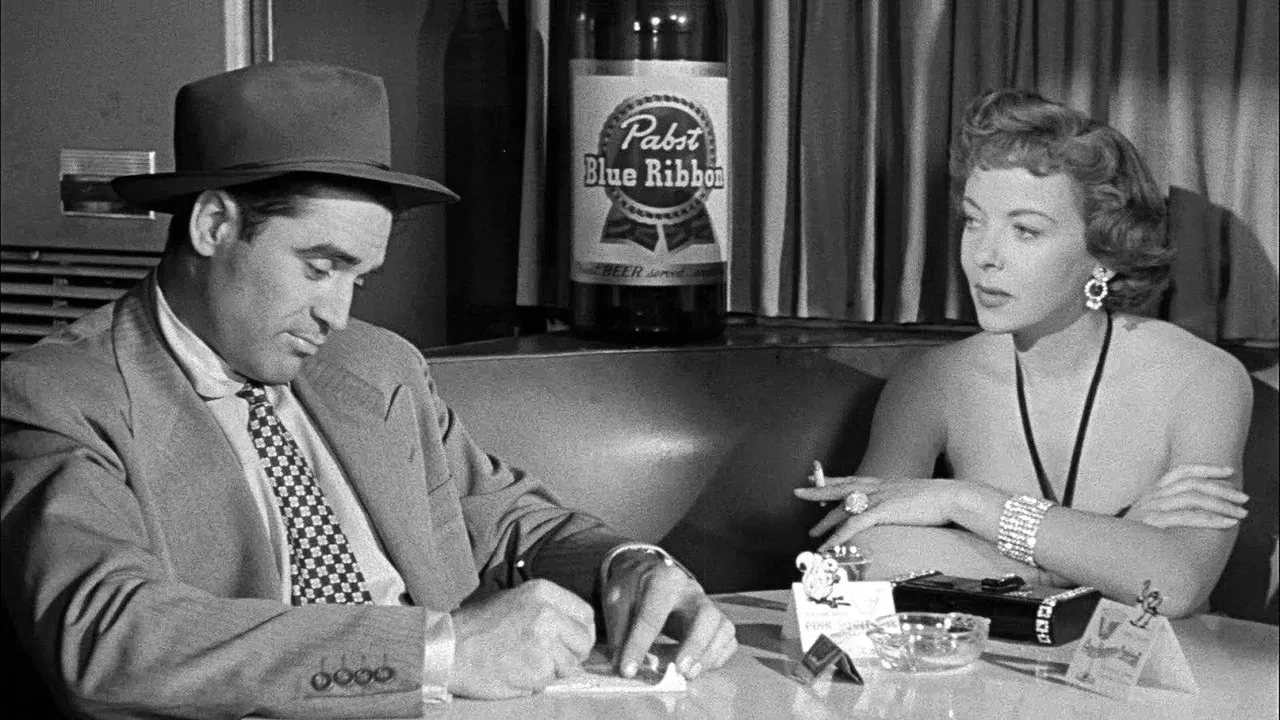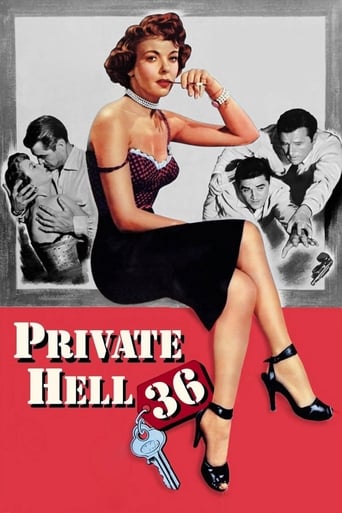

Co-screenwriter and star Ida Lupino wrote this tale of ambition with former husband (and producer) Collier Young. One of the costars is Howard Duff, her current husband, though in the film he's married to Dorothy Malone and his LA detective partner Steve Cochran is Lupino's love interest.***CONTAINS SPOILERS****The plot revolves around a cache of stolen, marked bills that begin turning up in LA, a year after being lifted in New York City. Lupino plays a down on her luck lounge singer in a class B type bar, who'd been tipped a marked bill by a boozy customer. She reluctantly agrees to go on stake outs at various racetracks with the boys; she also resigns herself to the affections of Cochran.After some time she spots the bad guy leaving the racetrack parking lot, a car chase and crash ensues and at the crash site, bad cop Cochran pockets some of the loot, to the dismay of good cop partner Duff. Cochran uses the singer's longing for a better life and diamonds as his motive. Then comes clean and admits to wanting a better life for himself.I won't divulge the ending, but good does triumph over evil.The movie is quite well directed by Don Siegel, though both co-writers and producers (Filmways was Lupino's studio) were said to have given him fits. Not being under a major studio's restraints a few things got passed by the censors. One is a scene with husband and wife (Duff and Malone) conversing in their bed, not the standard separate twin beds all movies showed at the time.Another is the Lupino-Cochran relationship. Frankly, he generally treats her like dirt, part of his character's ambition; part of her knowing that she's fraying at the edges. She's still attractive, but for how long? She's not desperate, but how far away is she from it? He's abusive and it seems to turn her on.Not great, but entertaining.
... View MoreIndependent filmmaker Ida Lupino didn't intend to make a B picture with PRIVATE HELL 36 but that's what happened. In the early 1950s, director/writer/actress Ida and her writer/producer husband Collier Young broke away from the studio system by forming "The Filmmakers" and they used it to tackle such topical subjects as rape and "ripped from the headlines" social commentary. Young and Lupino soon divorced but they kept their working relationship going and even used each other's new spouses in their "classy" exploitation films. Ida directed Collier's wife Joan Fontaine in THE BIGAMIST (1953) and her follow-up film was going to be "The Story Of A Cop" starring her husband, Howard Duff. At the time, big city police corruption and the Kefauver TV hearings on organized crime were hot-button issues that made national headlines and were inspiration to writers like William P. McGivern who fashioned roman-a-clefs in films like THE BIG HEAT (1953), SHIELD FOR MURDER, and ROGUE COP (both 1954). Never one to let a good story go by, Ida Lupino threw her bonnet into the ring but by the time she was ready to make "Cop", she and Duff had separated. They soon reconciled but, afraid to rock the boat, Ida decided not to direct her husband and hired Don Siegel, who had just made RIOT IN CELL BLOCK 11, for the job. The result, now called PRIVATE HELL 36, is the story of L.A.P.D. partners Steve Cochran & Howard Duff and what happens when temptation proves too much for one of them. Lupino actually tackles themes that many Films Noirs have been accused of doing now and then: capitalism, materialism, and the American Dream are the mitigating circumstances propelling the self-inflicted problems everyone involved have to confront. Loyalty and "the blue wall of silence" are also thrown in for good measure but the character study the film becomes disrupts the pace. The movie starts off with a murder/robbery but the real action doesn't come until after the half-way mark; in between are slow build-ups involving family man Duff and his wife, Dorothy Malone, and the single Cochran who's fallen for a witness in the case, nightclub chanteuse Ida Lupino. Ida's a bit old for her role as a sympathetic "femme fatale" but the dynamics between her and the seemingly laid-back Cochran are one of the film's highlights. The movie takes too long by half to get where it's going but the ride is fascinating -as is the back story:"Siegel was never comfortable working on the film and most of his memories of it are bad. He can remember little of it and readily admits that he may be blocking it out psychologically. The things he does remember are uniformly unpleasant. Siegel recalls there was a great deal of drinking on the set by the cast and producer. The script was never really in shape, ready for shooting, and Siegel was given little opportunity to work on it. He began to lose control of the picture, got into fights with Lupino and Young, had difficulty keeping Cochran sober, and got in the middle of arguments with his cameraman... One time, he recalls, Miss Lupino told Guffey that she wanted him to re-shoot something and even Guffey, whom Siegel describes as the mildest of men, exploded and became party to the bickering. 'I was terribly self-conscious on that picture,' recalls Siegel. 'I had just done a picture for Walter Wanger, RIOT IN CELL BLOCK 11, in which I had great authority, did whatever I wanted to do. Now I was on a picture battling for every decision, working with people who were pretentious, talented but pretentious. They'd talk, talk, talk, but they wouldn't sit down and give me enough time. They wouldn't rehearse. Perhaps it was my fault. Cochran was a good actor, but not when he was loaded, and I had a hard time catching him even slightly sober. I was not able to communicate with these people and the picture showed it. Strangely enough, I personally liked both Ida Lupino and Young and still do, but not to work with."Cinematographer Burnett Guffey had just won an Academy Award for FROM HERE TO ETERNITY and would do so again with BONNIE & CLYDE over a decade later. Don Seigel hired his friend Sam Peckinpah as "dialogue coach" and Howard & Ida's little girl had a bit part. The alcohol-fueled acting (enhanced by Leith Stevens' jazzy score) is fine all the way around with Steve, as usual, being the stand-out as he slowly reveals his character to be a self-assured sociopath under the badge. Recommended -but not for the usual reasons.
... View MoreDecent people struggling for keeping things going are suddenly tempted by a large amount of money coming from a long gone robbery. With its moral ambiguity and twists and the main focus on character development the writing and acting of "Private Hell 36" is above ordinary crime movies from that period. It is exactly what makes this early Don-Siegel-flick a true film noir despite a conservative crime movie posing as one. If you don't expect too much action and can relax while watching a slow paced middle section, which builds up tension carefully and therefore convincing, this one will give you a very enjoyable watch. Forget about the voice-over at the very end telling something about "good cops, bad cops", because that was simply the way they had to handle things in the fifties to avoid censorship. Besides the fact that Howard Duff appears a little too stiff once in a while, Ida Lupino, Steve Cochran and Dorothy Malone make it a real fine treat. I also liked the jazzy score - typical for that period on one hand, but perfectly creepy and surprisingly "modern" on the other.It is very obvious to me that Stanley Kubrick was highly inspired by this one for his very own sensational film noir "The Killing" that came out the year after. The race track as a central location, money blown out of an opened suitcase, a trailer park as a hiding place and especially the Ida-Lupino-character, which is very close to the one of Marie Windsor in "The Killing", brought that suggestion immediately up to my mind. In comparison to other movies at IMDb "PH 36" seems a bit underrated to me, maybe because everybody's expecting crime movies to be extremely fast paced as those that are made since the early 70's. In fact "Private Hell 36" is a grim little noir and for its fans that does mean something else. 8/10
... View MoreThis taut, low-key and highly effective B-movie film noir was an early example of a style that director Don Siegel came to perfect in his later films. Although dealing with robbery and murder it's at its most effective in the small scenes of domesticity between the central characters, a crooked cop, his partner and the women they are both involved with and there are good performances from Steve Cochran, Howard Duff, Ida Lupino and Dorothy Malone in these roles. (Lupino co-wrote the movie with producer Collier Young). Excitement is generated from not knowing exactly which way the characters might go and from the degree of complexity that both the players and writers invest them with. The denouement is a bit of let-down, however, with things tidied up too quickly and too neatly. Still, it's a commendable effort.
... View More